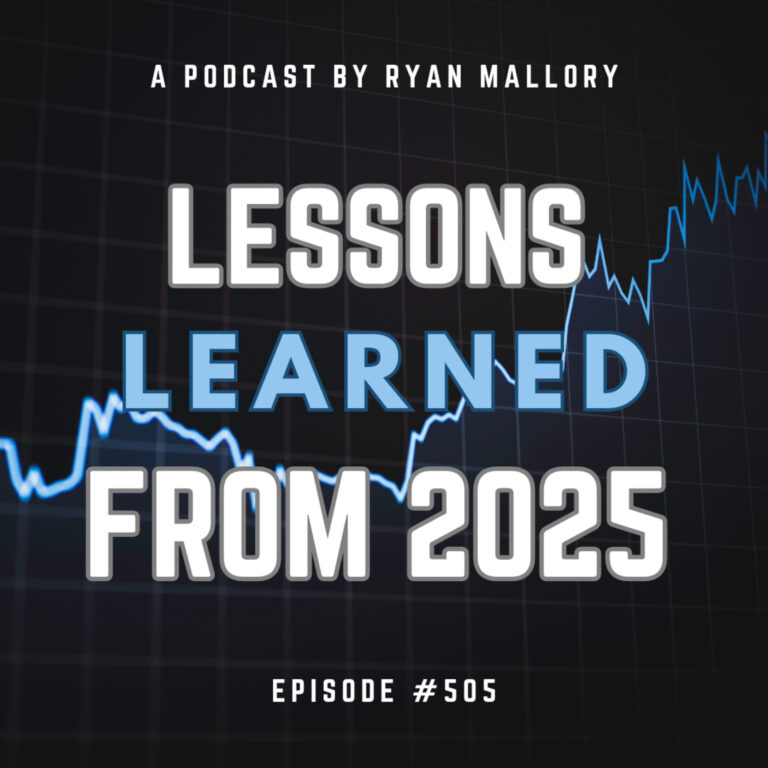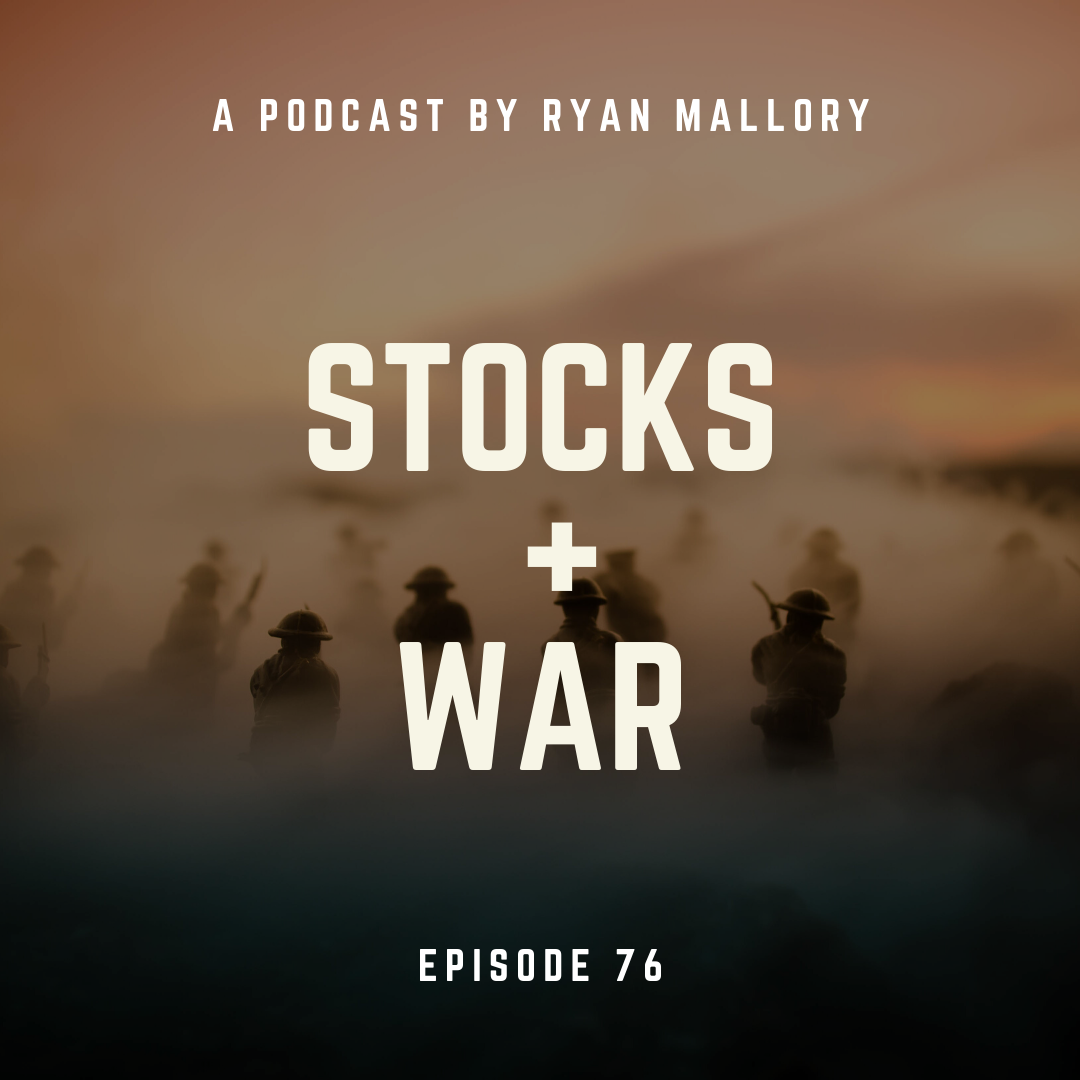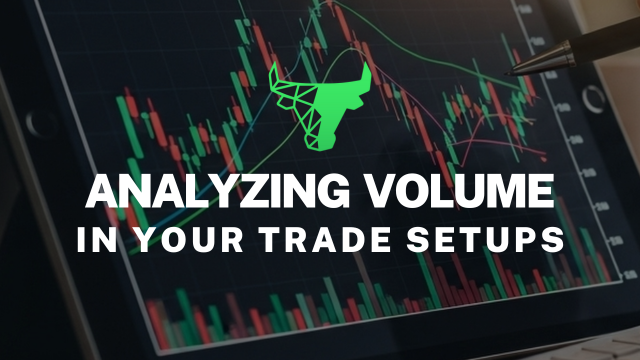Episode Overview
The United States, at any moment could find itself in a full scare war with Iran. Whether it happens is anyone’s guess, but in this podcast, I am going to detail how stocks react in times of war, whether you should buy, sell, or buy some more. War can can lead to short-term sell-offs that lead to amazing long-term gains.
Available on: Apple Podcasts | Spotify | Amazon | YouTube
Episode Highlights & Timestamps
- [0:07] Navigating War Talk and Podcast Goals
Ryan opens the episode with reflections on recent posting inconsistency and introduces the episode’s focus on war with Iran and stock market reactions. - [1:22] Avoiding Overreaction to Geopolitical Risk
Why social media panic around World War III is likely overblown and how Trump’s measured response may have soothed markets. - [4:23] Market History: War and Stock Market Performance
Ryan provides historical data on how markets typically react one year after conflicts or geopolitical events, emphasizing context such as recessions. - [6:15] Sectors That Benefit During Crisis
Safe haven sectors and defense stocks come into play during war fears, while high-growth and speculative stocks often suffer. - [9:50] Don’t Let War Headlines Dictate Long-Term Strategy
Ryan explains why long-term investors shouldn’t liquidate portfolios due to war fears, and why patience often pays off.
Key Takeaways from This Episode:
- History is a Guide: Markets often bounce back within a year of geopolitical shocks unless paired with a recession.
- Safe-Haven Sectors Provide Shelter: During market fear, Staples, Utilities, Gold, and Defense stocks tend to attract capital.
- Avoid Panic Selling: Selling long-term positions due to fear leads to missed rebounds and poor timing.
- Market Uncertainty is Constant: War is part of history and will continue to be priced in. Traders should be prepared for it, not surprised.
- Cash Can Be a Strategy: If uncertainty is too high, sitting in cash is smarter than forcing trades.
Resources & Links Mentioned:
- Swing Trading the Stock Market – Daily market analysis, trade setups, and insights by Ryan Mallory.
- Join the SharePlanner Trading Block – Get real-time trade alerts and community support.

Take the Next Step:
✅ Stay Connected: Subscribe to Ryan’s newsletter to get free access to Ryan’s Swing Trading Resource Library, along with receiving actionable swing trading strategies and risk management tips delivered straight to your inbox.
📈 Level Up Your Trading: Ready for structured training? Enroll in Ryan’s Swing Trading Mastery Course, The Self-Made Trader, and get the complete trading course, from the foundational elements of trading to advanced setups and profitable strategies.
📲 Join the Trading Community: Sign up for SharePlanner’s Trading Block to become part of Ryan’s swing-trading community, which includes all of Ryan’s real-time swing trades and live market analysis.
Full Episode Transcript
Click here to read the full transcript
0:07
Hey, I’m Ryan Mallory and this is my Swing Trading the Stock Market podcast. I’m here to teach you how to trade in a complex ever-changing, world of Finance, learn what it means to, trace profitably, and consistently managing risk, avoiding the pitfalls of trading. And most importantly, to let those winners run wild, you can succeed at the stock market and I’m ready to show you.
0:28
How? Hey, everybody, this is Ryan Mallory with Swing Trading the Stock Market and listen, I get it. I’ve been backsliding. Little bit here over the past month or so I think I got one out and December, maybe two in December. I’m not totally positive but I know it’s been like a couple maybe three weeks since I did.
0:45
Like did my last podcast? And yeah you guys probably are expecting them every Wednesday as I usually do. But hey, new, your new calendar, new decade sticking with the wind stay schedule. Doesn’t mean I’m going to be perfect at it the whole time but hey, if I can get 50 Baht podcasts out or so a year, I think I’m doing a pretty darn good job.
1:01
I would say so anyways, what are we talking about? Well, guys, In the news right now. War war with Iran, right? Probably never going to see it happen but you just never know. There’s people there’s actors between the United States and Iran. Could one bad move could throw us right into a major war e World War 3 and I don’t know.
1:22
I mean you got to have a whole bunch of countries fighting right to have a big world war. May just be an Iran versus u.s. think Hood Ever did get to that point. I don’t see it. A lot of countries really wanting to throw. Soldiers at this whole problem, so I really don’t see it.
1:39
Turning into the World War 3 like social media keeps talking about, Believe It or Not, Trump is is actually whether whatever you think about. He’s doing a pretty good job with his words, okay? I get that. He can be kind of a loose cannon on Twitter and everything else and that he can say things you’re like holy cow but when he hasn’t called I ran a horse face he hasn’t called him Rocket Man or anything else like that and kind of be funny if you did.
2:05
But the other thing is that he has been very measured with with his response to like the attacks on the Iraqi basis. Today, he did not, he didn’t go hog-wild, so he could have easily launched a whole bunch of missiles and whatever he would have done.
2:22
He would have had a base that would have supported it. Basically been my, hey, Bowman to hell, you know, and you have, but he didn’t do that. He could have done that, but he took a more measured approach. I think a lot of it too. Is, he doesn’t want to Rattle the stock market. If you look at the stock market the night before, what was it doing?
2:38
It was down. 50 freakin points. Okay, that’s the S&P, 500 futures. The Yes, down 50 plus points. That’s a big deal. It crazy enough. It was in the green this morning, trading, I’m okay, because they started realize. Okay, Trump’s probably not going to destroy Iran.
2:56
He’s not going to retaliate. He could, there was no US troops lost and I think that was the key in the whole thing. Yeah, nothing to is, it makes more sense because now he can get more European countries and others that deal with Iran and say, hey, look, instead of going to war with these guys, let’s do some sanctions. You’ll probably get more people to sign up for that hope and that that We’ll just stop this whole mess and Iran’s it.
3:16
Ran isn’t a mess because of the sanctions. People can even use credit cards in Iran. I also think too that he probably improves his re-election chances because everybody has said, you know, he’s the crazy guy with his finger on the button on the nuclear Button. He’s got the nuclear football, he could just, you know, wake up in a bad mood and launched it, a bunch of missiles one day, that’s what’s been said of him for a long time now, but what did he do?
3:37
He did the exact opposite. He didn’t retaliate. He actually showed a lot of calm. He was the bigger person in the room and he found a way to make peace and he did that. Ultimately, I don’t think he wants war with her, and I don’t think he wants war with anybody right now. He doesn’t like it. I mean, if you look at his past Twitter comments, over the years, he’s kind of hated the whole Middle East War thing.
3:57
And so I think he’s trying to avoid it with a passion and yeah, it’ll be interesting to see what happens if he does. Get reelected will be interesting to see, you know, does the relations ever improve with Iran? So any case that’s not about this particular podcast only, okay, I’m trying to get into Two more of the history of war and stocks and what tends to happen when the United States goes to war with the country and and that in the stock market fall out.
4:23
So, ultimately, and this is, this is based off of my observations with the stock market and with with the With the returns that the stock market has provided over the years, typically, the stock market, the S&P 500 was hired 12 months later and the last nine events that took place in the Middle East.
4:44
Now the three instances where the market was lower, it actually coincided with a recession. So you take you take 911, for instance, right? Three months later, we were up two and a half percent. Six months later, we were up 6.7% one year later, the stock market was down. 18.4%, but when did 9/11 happened, it happened in 2001, what did the stock market do in 2000?
5:05
It was down. What did it do in 2001? It was down. What did you do in 2002? It was down. The stock market was in a recession during a three-year period. So can you blame the Afghanistan war and 911 on the reason why the market was down? 18.4%, one year later note, we were no we were in a recession.
5:22
Okay, but when it initially happens, you usually do see some weakness in the market. The market doesn’t like Uncertainty, it doesn’t like. Knowing whether or not missiles are going to be raining in on the Homeland or whether or not oil supplies are going to be disrupted.
5:39
It doesn’t like any of that stuff. It causes fear. It causes people to want to scale back on their positions to not hold, as many long positions. So when Iran launched missiles into the Iraqi air bases, that freak the markets out.
5:56
Sent us down, you know, about 2% on the NASDAQ, almost 2% on the S&P 500. Why? Because it doesn’t like the uncertainty. It didn’t know what Trump was going to do next. Next, when it became clear that Trump wasn’t going to retaliate by launching some missiles of his own or, you know, shooting a whole bunch of dropping, a whole bunch of bombs on on, on Iran or on their palaces or whatever.
6:15
The markets, calm down immediately bottomed and took a huge Spike up. So what sector should you focus on traditionally when the markets getting weekend or when there’s a lot of panic people want to go to Safe sectors, they want to go to Staples. They want to go like like Costco or Walmart.
6:32
They want to go to Two utilities like nextera energy, or Duke Energy. They want to go to materials like you’re like your gold stocks right? Or just GLD ETF. They want to go that were they just go cash? With war.
6:49
Those are all in play too. Does it mean that they’re all going to go up? But a lot of people are going to sell technology. They’re going to sell health care because either your, these are your growth sectors, right? So, they’ll sell Tech. They’ll sell health care. They’ll sell discretionary, they’ll sell? What am I forgetting here?
7:06
Industrials. Okay, but there’s a caveat with Industrials defense stocks defense, stocks are always part of the industrial sector. So when you start seeing the selling and Industrial stocks doesn’t mean that stocks like Northrop Grumman, which is NOC.
7:22
Lockheed Martin LMT Boeing. Okay. Forget I said bowing right now because they know what bullying is got planes falling out of the sky all the time and their stocks just been getting whacked a lot. But when planes are not falling out of the sky, bowing tends to be a good defense stuff. Okay, now right now because if you’re going to have a war, doesn’t help that you have a plane falling out of the sky to at the same time, but yeah, Lockheed Martin Northrop Grumman and LH X, which is L3 Harris, Local Company here, and the State of Florida Central.
7:56
Florida area. You’re going to want to avoid your high growth stocks, in general, you’re going to, you just don’t want to go play in those kinds of Trades because if you’re getting into like a small cap, biotech middle of a war people. Going to start selling those growth stocks. Yeah, you’re going to say what the hell does biotech have to do with war, nothing really?
8:18
Okay? But the markets going to sell. They’re going to sell When Things become overvalued during a time of War, does it mean that when you’re later, they won’t be higher? Okay. And so, do you need to sell all of your long-term positions because we’re going into what know? Otherwise there would be a long-term position.
8:35
There’s always going to be volatility uncertainty especially when it comes to the Middle East. I’m a firm believer. You’re never going to see peace in the Middle East. I just don’t I just think it goes back to the Biblical times right? I mean nobody’s ever liked anybody in the Middle East I don’t think Trump I don’t think Obama.
8:51
I don’t think any future president has the ability to broker peace in the Middle East one of the nicest guys ever Jimmy, Carter, right? You may or may not have voted for them. I wasn’t able to vote at that time. I wasn’t old enough guy. Seems like a pretty nice guy mean for Pete’s sakes two dudes in his 90s and he’s still building homes for Habitat for For Humanity, okay.
9:12
You cannot even get close to the broker and peace in the Middle East, so I don’t ever think that’s going to happen. So I always think that there’s going to be a level of uncertainty and the Middle East, right? So, does that mean you have to sell off your long-term positions?
9:34
No, you don’t have to sell all of your long-term positions because if we did, you would never have a, you would never have a long-term position because there’s always War. There’s always conflict. So, you can’t let a possible War be a reason why you sell your long-term positions because that’s just foolish. It’s just part of the human condition.
9:50
You’re always going to have war and it’s always going to have some kind of bearing on the stock market, whether it involves the United States. Whether virals, Syria, Iran, Iraq, Kuwait, Russia, anybody? Okay? You just go back through time. There’s always going to be War. It’s always going to be on the market.
10:09
Overall, the market tends to price it in fairly well over the course of a year because 75% of the time over the last 12, conflicts, the stock, market’s up higher. During that time, So if you have some high beta stocks and stocks that have a lot of volatility, maybe you were wanting to make a long-term position out of it. You’re just not sure in the short term whether or not that’s ideal because in the short term, there is some stock market Jitters.
10:24
That can send prices lower, maybe you get rid of those. But if you got it like a long-term, you’ve been holding this? A you’ve been holding McDonald’s for 20 years. Does that mean that you go ahead and get rid of McDonald’s? No, you don’t get rid of McDonald’s. Okay. McDonald’s is McDonald’s, is going to be around. Okay. It’s not going to.
10:40
Hit the ash heap of History because because of a war with Iran. Okay, maybe there’s a I don’t know, maybe if there’s a McDonald’s in Iran, maybe these will be targeted, who knows? I don’t know. But any case don’t don’t get too worked up about selling all of your long-term positions because of war and because you think that that the stock market’s going to crash.
11:01
So let’s go back in history. Let’s go check out some of the more historical times where the stock market has seen some some major wartime conditions take the Pearl Harbor attack. December 7th, 1941 Market drops three point. Eight percent Total Drama down was about 20 percent.
11:20
It took over 143 days. Days for the market to bottom and three hundred, seven days to recover. You gotta remember, we’re coming out of the Great Depression here. It was war that brought us out of the Great Depression. So that’s probably one of the most extreme examples. You’re going to see another one would be back in the 1990s night, August 2nd, 1990, Iraq, invasion of Kuwait drop 1.1% that day and then saw almost a 17% pull back, rarely Do you ever find a stock market that won’t react at least that very next day negatively to the to a major war outbreak.
12:02
I think the only one was the Yom Kippur War back in 1973. Finished up point three percent. You also had the Suez Crisis up point three percent outside of that, you just don’t have a lot, a lot of others London, subway bombing. That was a point nine percent.
12:18
Was that really a word? No, is just a major geopolitical event and the stock market, reacted. Yeah. There’s some, there’s some pretty big draw Downs that also happened thereafter as well, but ultimately, the stock market tends to recover and at least, in the case of the last nine, out of the last 12 times, it does recover within the year.
12:35
Now, when you take the Iran, Crisis here, where they launch missiles into the Iraqi Air Base. Well, we consider that and Grand scope of History. A geopolitical event. And and when we’re trying to figure out what did the stock market do thereafter?
12:51
Yeah, I think probably. So and if you look at the stock market today, it’s doing actually phenomenally. Well, even if I as I type this, it’s a point seven percent. It’ll be one of the best reactions to a geopolitical event we’ve ever seen outside of the London, subway bombing that, I just mentioned. So should we be all that worried?
13:07
Out this particular event here. No, I don’t really think you should because like I said in the beginning, comments of this podcast, Iran and USA, both actually seem like they’re trying to save face with their pop with their own people, but they’re also trying to make sure that neither side does anything else.
13:23
I think if they wanted to, they could have probably hit some major interests of the United States there in the Middle East. It could have gone after some oil interests, they could have. They could have hit some allies like Israel, they did it. They seem to have actually purposely missed the airbase.
13:40
They just try to get it close enough. So that the the headlines would read the air, bases were bombed and ultimately, how the market how the market does, it’s going to depend on the economy itself right now. The economy is very strong and part because we got the FED doing that, not qe4, even though it’s qe4, that’s helping out the market.
13:59
You have the trade war with China. Having been wrapped up, taking a lot of headline risk off the table. Iran, of course, is a Piece of headline risk. Kind of seems like today at least in the very, very short term. It might be off the table, so that’s going to do it for today.
14:16
If you have any questions, feel free to email me. ryan@shareplanner.com a lot of new changes to SharePlanner or especially with what used to be called the Splash Zone. The Splash Zone is now called the trading block, to be honest, I didn’t quite like the name to Splash Zone.
14:32
It happened back in 2010, 2011, when it was first launched, SharePlanner was launched back in. 7. But that came about 2010-2011, I think 2011 and just wasn’t a big fan of it so I’ve changed the format around of it a little bit more but for the better not so much because I’m I’m necessarily changing the way I trade, but I’m just trying to provide more opportunities, more trade setups, more actions, more things to work on.
14:55
I’m trying to give you more advanced. Notice of when I’m going to be making a trade where I’m going to be making it out of think, it’s worth checking it out. 7-Day trial, do try and tell me what you think. Take care God. Thanks for listening to my podcast. Swing trading the stock market.
15:11
I like to encourage you to join me in the SharePlanner, trading block, where I navigate the stock market. Each day with Traders from around the world with your membership, you will get a 7-Day trial and access to my trading room including alerts via text email and WhatsApp. So go ahead sign up by going to shareplanner.com trading block, that’s www.shareplanner.com/trading-block.
15:33
And follow me on SharePlanner’s, Twitter and Instagram and Facebook. Facebook where I provide unique market and trading information every day you have any questions please feel free to email me at ryan@shareplanner.com all the best to you and I look forward to trading with you soon.
Enjoy this episode? Please leave a 5-star review and share your feedback! It helps others find the podcast and enables Ryan to produce more content that benefits the trading community.
Have a question or story to share? Email Ryan and your experience could be featured in an upcoming episode!
Become part of the Trading Block and get my trades, and learn how I manage them for consistent profits. With your subscription you will get my real-time trade setups via Discord and email, as well as become part of an incredibly helpful and knowledgeable community of traders to grow and learn with. If you’re not sure it is for you, don’t worry, because you get a Free 7-Day Trial. So Sign Up Today!

Welcome to Swing Trading the Stock Market Podcast!
I want you to become a better trader, and you know what? You absolutely can!
Commit these three rules to memory and to your trading:
#1: Manage the RISK ALWAYS!
#2: Keep the Losses Small
#3: Do #1 & #2 and the profits will take care of themselves.
That’s right, successful swing-trading is about managing the risk, and with Swing Trading the Stock Market podcast, I encourage you to email me (ryan@shareplanner.com) your questions, and there’s a good chance I’ll make a future podcast out of your stock market related question.
Each year I like to take a moment to reflect on my swing trading from the prior year. The 2025 trading year offered a lot to be happy about, but it also changed my views in a number of ways and gave me some lessons to take from it, as well as some new perspectives to take into 2026 as I navigate the stock market for yet another year. I'm hoping this moment of reflection in this podcast episode will be as beneficial for you as it was for me in making it.
Be sure to check out my Swing-Trading offering through SharePlanner that goes hand-in-hand with my podcast, offering all of the research, charts and technical analysis on the stock market and individual stocks, not to mention my personal watch-lists, reviews and regular updates on the most popular stocks, including the all-important big tech stocks. Check it out now at: https://www.shareplanner.com/premium-plans
📈 START SWING-TRADING WITH ME! 📈
Click here to subscribe: https://shareplanner.com/tradingblock
— — — — — — — — —
💻 STOCK MARKET TRAINING COURSES 💻
Click here for all of my training courses: https://www.shareplanner.com/trading-academy
– The A-Z of the Self-Made Trader –https://www.shareplanner.com/the-a-z-of-the-self-made-trader
– The Winning Watch-List — https://www.shareplanner.com/winning-watchlist
– Patterns to Profits — https://www.shareplanner.com/patterns-to-profits
– Get 1-on-1 Coaching — https://www.shareplanner.com/coaching
— — — — — — — — —
❤️ SUBSCRIBE TO MY YOUTUBE CHANNEL 📺
Click here to subscribe: https://www.youtube.com/shareplanner?sub_confirmation=1
🎧 LISTEN TO MY PODCAST 🎵
Click here to listen to my podcast: https://open.spotify.com/show/5Nn7MhTB9HJSyQ0C6bMKXI
— — — — — — — — —
💰 FREE RESOURCES 💰
— — — — — — — — —
🛠 TOOLS OF THE TRADE 🛠
Software I use (TC2000): https://bit.ly/2HBdnBm
— — — — — — — — —
📱 FOLLOW SHAREPLANNER ON SOCIAL MEDIA 📱
*Disclaimer: Ryan Mallory is not a financial adviser and this podcast is for entertainment purposes only. Consult your financial adviser before making any decisions.





